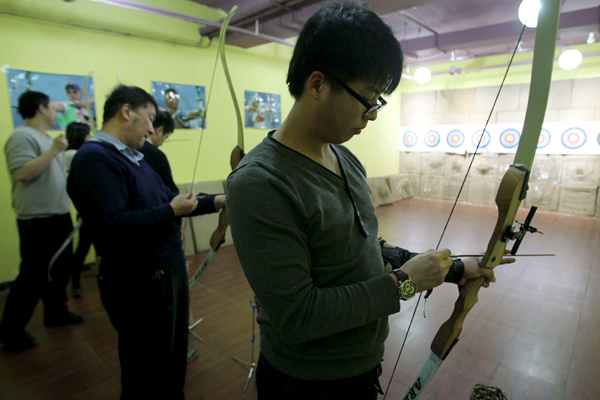The lure of opportunity that comes with a job offer in the world's economic powerhouse is clouded by the health risks associated with living in cities stifled by smog.
Among the 3,000 expatriates who spend their free time playing a range of outdoor sports organized by the Shanghai Rugby Club, the daily air pollution ratings dominate pre-match discussions.
 |
|
People in a Beijing gym on Sunday turn to indoor exercise, such as archery, swimming and running, as smog shrouds the city. [Zhu Xingxin/China Daily] |
The deputy general manager of the club, James King, said that while adults acknowledge poor air quality, they play on.
But parents are becoming increasingly concerned for their children.
"The pollution affects all of the junior sports," King said. "The parents always check the pollution levels from the government (Ministry of Environmental Protection) and those published on the US embassy and consulate website.
"If a game is scheduled under poor air quality we don't cancel it, but teams are sometimes forced to play with less people because some players won't show up.
"Nobody wants the pollution, but it seems there's nothing we can do. We're in a country of super cities and we need the surrounding industries for growth."
Australian Shabi Gul and her Austrian husband, an organic body products importer, have called Shanghai home for the past 13 years. With two children aged under 5, the couple has discussed packing up and moving to cleaner areas in the interests of their kids' health.
"My children seem OK, but do you want your kids to grow up in a place which reports that if you spend time outside it will be hazardous to your health? A lot of parents have the same worry", Gul said.
The mother organizes social family days in Shanghai with her children's school and sporting friends and their parents. At the last event, 20 families were expected to show up for a lunch, but poor air quality meant only half attended.
"That day the Air Quality Index was 290 (a safe level is deemed to be 50 or below)," she said. "It looked bad outside and I also had some misgivings about taking my kids out there. The way parents with young kids feel is that they definitely don't want to expose them to this level of air pollution, especially if they are going to be running around outside. I know it's constantly on people's minds."
She is also glad her children's school takes pollution seriously, given stories parents hear of developmental and respiratory problems in young people.
At the Montessori Children's Academy in Shanghai, pupils are kept indoors when the AQI rises above 200. Classrooms now have air purifiers installed for extra safety.
Ken Holloway, who founded the Shanghai American Football League, said while the competition he created doesn't have an official policy on air pollution, he will need to consider something soon.
"The school my children attend monitors the AQI and their outdoor activities, like recess and sports, can be affected," he said. "I would expect non-school-affiliated programs like mine will need to put some policies in place to be consistent with the schools."
A spokesperson for Shanghai Tigers Australian Rules Football Club said matches are not cancelled due to pollution levels, saying the worst pollution is often in winter, when competition is on a break.
According to the report from the Ministry of Public Security, about 220,000 foreign workers were working on the Chinese mainland by the end of 2011, most of whom are working in foreign companies, joint ventures and schools.
Clubs and expat social organizations are common, with one of the key discussion points being how to cope with poor quality air.
Some expatriates get an allowance of between 2 and 15 percent of their total earnings when relocating to cities like Beijing and Shanghai. Health and air quality are two of the key reasons for the extra payments.
International human resource and recruitment companies recommend extra payments as "assumed" when calculating an expat in China's projected salary. But in reports by Mercer and Hays, the percentage of the allowance linked to air quality is not specified.
Various expat blogs warn newcomers to invest in facemasks when they have to ignore the warnings to head outside.
Apps for smartphones, such as FreshIdeas Studio's China Air Quality, compile air pollution readings from cities across China from official government readings and US consulate results, sending warning messages when the air becomes unsafe.
